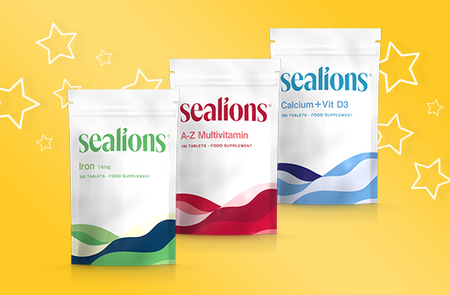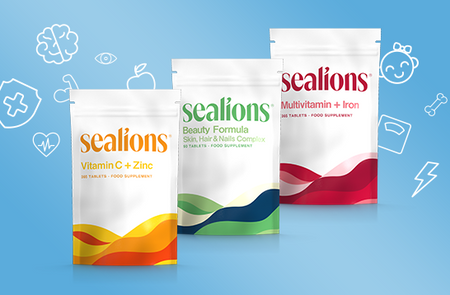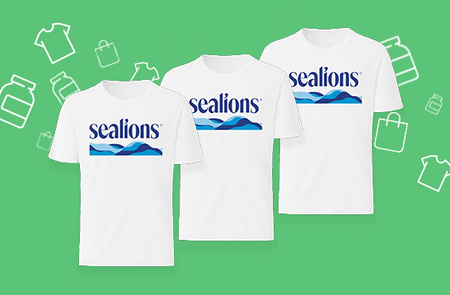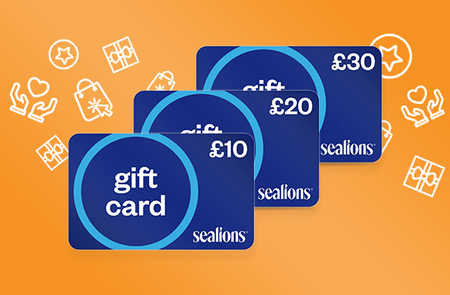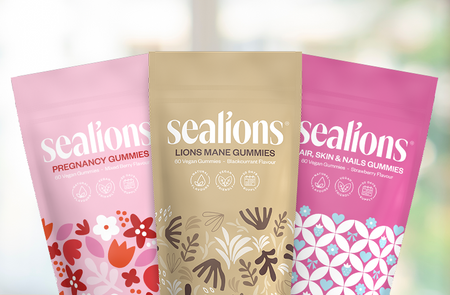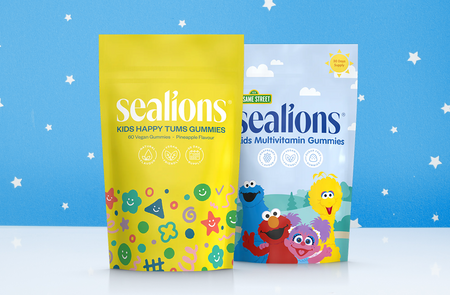
Sealions Vitamins: The Ultimate Guide to Whey Protein
Whey protein has become a staple in the fitness world, but it's not just for bodybuilders or athletes - it's a powerful aid for anyone looking to boost their nutrition and reach their health goals.
Whether you're trying to build muscle, lose weight, or simply improve your overall diet, understanding whey protein is key to unlocking its full benefits.
In this ultimate guide, we'll break down everything you need to know about whey protein, from what it is and how it works, to how to choose the right type and incorporate it into your routine.
Ready to level up your nutrition game? Let's get stuck in!
What is whey protein?
Whey protein is renowned for being one of the highest-quality proteins. It comes from milk produced during cheese-making processes. As the cheese curds, the liquid left behind contains high levels of protein, which manufacturers then dry and turn into a powder.
Once the liquid turns into a powder, manufacturers can turn it into protein shakes, bars and other products. People then consume it to boost their daily intake and promote muscle growth.
Whey protein on its own doesn't taste good, but manufacturers add flavourings to the powder, creating a tasty formula.
It's essential to remember that whey protein ISN'T suitable for vegans as it uses milk.
The types of whey protein
There are three types of whey protein, with each having unique benefits and properties:
- Whey Protein Concentrate: Whey protein concentrate is the most popular form, containing between 70% and 80% of protein. WPC is less processed than other forms, preserving nutrients without sacrificing affordability.
- Whey Protein Isolate: If you're looking for a high protein hit, WPI goes through further processing to remove fats, lactose and carbohydrates. This results in a 90% and higher protein content. On the downside, whey isolate brands are often more expensive.
- Whey Protein Hydrolysate: Athletes and fitness enthusiasts often rely on WPH, the most processed option. The protein is broken into smaller peptides, promoting rapid absorption but is highly expensive.
The benefits of whey protein
Whey protein offers a host of benefits, which is why so many people use it. Abundant in essential amino acids, including BCAAs, introducing whey protein into your diet can support your weight loss goals, build muscle mass, and enhance your overall fitness.
Muscle growth
Whey protein is renowned for promoting muscle growth and speeding up repair after workouts. Studies show that individuals who practise regular resistance training build more muscle mass than people who don't use it (MDPI).
With its concentration of BCAAs - including leucine - whey protein stimulates protein synthesis in the muscles. However, it's important to remember that most benefits come with regular exercise, and whey protein doesn't automatically build muscle mass.
Weight management
If you're embarking on a weight loss journey, meal replacement supplements formulated to deliver your daily nutrients might be best. Protein supplements are best for reducing hunger and the need for snacking between meals.
Research shows that whey protein can reduce hunger after workouts, decreasing overall calorie intake (NCBI). It's also beneficial for preserving lean muscle mass and promoting a healthy metabolism.
Faster recovery
If you often see people drinking a protein shake or snacking on a protein bar after their workout, it's for good reason. Whey protein speeds up post-workout recovery and muscle repair. It's packed with amino acids, which can decrease soreness and provide faster recovery times.
Exercising regularly is key to overall health and wellbeing, but workouts can often result in soreness. Adding whey protein to your routine could help you go harder and faster for longer.
Immune system support
Most people associate whey protein with fitness without realising it's a powerhouse immune system supplement. The powder contains lactoferrin and immunoglobulins, both of which can increase immunity and reduce the risks of infections.
Using whey supplements can also enhance antioxidant activity, reducing the effects of oxidative stress (AgroPur).
How much protein do I need?
Protein is a vital nutrient for adults and children of all ages. The big question is, are you getting enough for your daily needs? According to Government Dietary Recommendations, women should consume at least 45 grams of protein daily, while men have higher needs, at 55 grams.
While these figures can be helpful, everyone has unique protein needs. If any of the following apply, you should increase your protein intake.
- Age: Protein is vital for growth and development until early adulthood. Older adults can experience muscle loss, but consuming higher protein levels can prevent this from happening.
- Activity Level: Highly active people and athletes require high protein diets to promote muscle repair and recovery. If you're lightly active or sedentary, consuming too much protein could lead to weight gain.
- Muscle Mass: Protein helps you maintain muscle mass, making it essential for people who are more toned. Not getting enough protein could make your workouts ineffective.
- Medical Reasons: As protein can support the immune system and promote healing, increasing your intake when battling an infection can speed up recovery.
- Weight Goals: Protein can support your weight loss goals but often requires a balancing act. A higher protein intake benefits muscle gain, but only when you perform regular exercise and strength training.
- Genetics: Genetics can also play a role in your protein intake requirements. Some people process and use protein faster than others.
- Pregnancy: Pregnant and breastfeeding women require more protein to support the baby's development and produce breast milk.
Natural sources of protein
You'll find protein in various sources, but dietary choices can impact the amount you can receive from diet alone. Here are the main sources of natural protein:
Meat
Animal meat has high amounts of protein, especially lean meats such as chicken and beef. Remember that meats that contain high amounts of fat can cause weight gain, so opt for tenderloin and sirloin beef.
Seafood and fish
Oily fish are packed full of omega-3s and healthy fats but have a decent protein content. Tuna, salmon, cod and shrimp offer high amounts of protein, with tuna being the most convenient option.
Dairy
Whey protein is a by-product of the cheese production process, and many people increase their dairy intake to reach their goals. It's essential to remember that full fat milk, yogurt and cheese can lead to weight gain due to the fat content.
Eggs
Eggs are easy to prepare and perfect for a quick breakfast. They also have an impressive protein content. If you want pure protein, egg whites are ideal, but the yolk also contains vital nutrients, including amino acids.
Legumes
Being on a plant-based diet doesn't mean you won't get any protein, as legumes are absolute powerhouses. Lentils and chickpeas are the go-to legumes, with each offering versatility. Cook up a curry or make a chickpea tuna-style sandwich, and you'll get plenty of protein.
Seeds and nuts
Certain nuts and seeds can boost your protein intake. They include pumpkin seeds, almonds, peanuts and chia seeds. Almonds can increase your Vitamin E intake, while chia seeds contain high amounts of Omega-3s. They're often essential nutrients in high protein diets.
Soy products
Tofu, edamame and tempeh contain protein and vital nutrients, making them excellent substitutes for meat. Remember that many meal alternatives contain high amounts of salt, so be sure to check the labels thoroughly before making a decision.
Vegetables and whole grains
Green vegetables like spinach, broccoli, and Brussels sprouts can increase your protein intake, along with brown rice and quinoa. Eating a meat substitute with brown rice and green vegetables gives you a healthy, protein-rich meal.
Foods by protein content
| Food | Average Grams Protein Content Per 100 Grams |
| Pork Loin | 38 |
| Chicken Breast | 31 |
| Beef Sirloin | 31 |
| Tuna | 29 |
| Shrimp | 24 |
| Salmon | 22 |
| Cod | 18 |
| Cheddar Cheese | 25 |
| Full-Fat Greek Yogurt | 22 |
| Chickpeas | 19 |
| Lentils | 18 |
| Tempeh | 16 |
| Black Beans | 15 |
| Quinoa | 14 |
| Whole Eggs | 13 |
| Tofu | 8 |
| Brown Rice | 5 |
Can whey protein replace natural sources?
Introduce natural protein sources into your diet wherever possible. Small lifestyle changes, such as eating lean meats instead of fried chicken and processed foods, can benefit your overall health and wellbeing.
Due to food limitations, vegans often struggle to meet their daily protein intake needs. Adding whey protein powders to your diet can make a significant difference, as they're easy to use and contain a high amount of protein and other nutrients per serving.
How to use whey protein supplements correctly
Whey protein alone doesn't taste nice, but manufacturers add flavouring to make it more palatable. The best thing about whey protein products is that they're easy to consume and fit into your diet. Whether you prefer drinks or snacks or are willing to go the extra mile, here are the best ways to up your protein intake.
Protein shakes
Protein shakes are the most popular product because you just mix them up and can drink them on the go. Most whey protein supplements are best mixed with water, but you can combine some with milk for added calcium.
Our Whey Protein Powders use all three types of whey, providing optimal benefits for each person. They're also available in delicious flavours, including chocolate, vanilla and strawberry.
Just add 200ml of cold water to the shaker, then add two level scoops of protein powder. Then mix it together and you're good to go.
Protein bars
Protein bars are the second go-to choice, especially for fitness enthusiasts. Some contain whey protein, while others might use plant-based ingredients or other forms of protein. We offer Battle Bites bars, which contain 20 grams of protein per serving and come in dessert-themed flavours.
If you love a chocolate fix, try Battle Bites Dynabars and enjoy hazelnut, peanut butter or chocolate fondant flavours.
Baking and cooking
Whey protein powder can also be used in various recipes to increase the protein content of your meals. Adding it to pancakes, baked goods, yoghurts, and oatmeal creates a healthy breakfast or snack that sets you up for the day.
Potential side effects
While whey protein is safe for most people, you might experience some side effects if you take too much or have a severe lactose intolerance. If you experience any of these effects, you should either reduce your intake or explore plant-based protein supplements:
- Digestive Issues: Whey protein contains minimal lactose, but people with a severe intolerance might experience some digestive discomfort.
- Allergies: While rare, whey allergies can occur in some people. If you have symptoms like breathing issues, itching or a rash, discontinue use immediately.
- Kidney Issues: Check whether you can consume whey protein with your specialist if you have a kidney condition. It can put extra strain on the kidneys.
Shop high-quality protein supplements with Sealions
If you're looking for quality whey protein supplements at excellent prices, Sealions won't let you down. We're one of the UK's most popular supplement providers, combining affordability with quality. Buying whey protein powder from us gives you access to:
- Incredible Savings: Buy one pouch for £15.00 and take advantage of 22 servings. Our powders cost a fraction of other brands, but you'll never need to worry about quality.
- Delicious Flavours: Our whey powders are formulated to provide maximum nutritional benefits without sacrificing flavour. Enjoy the traditional taste of strawberry, keep it simple with subtle vanilla, or go all out with Battle Bites bars for a decadent treat.
- Fast Delivery: We aim to dispatch your order as soon as possible. We also offer cost-effective delivery throughout the UK.
The bottom line
Whey protein is one of the most effective ways to boost protein intake and promote muscle mass. It can also speed up post-workout recovery and propel you towards immediate and long-term fitness objectives.
By choosing the right type of whey protein and incorporating it into your diet effectively, you can reap its benefits. Remember to consider your needs, preferences, and potential side effects, as with any supplement.
Shopping with Sealions means you can seamlessly integrate whey protein into your lifestyle. Shop today, or feel free to contact us with any questions.
FAQs
What's the best whey protein for older adults?
Older adults might struggle to get used to protein drinks and bars, but they can mix whey powder into pancakes and other foods. Older people might find consuming whey protein powders this way easier, and it still offers the same effects.
What are the benefits of whey protein for females?
Whey protein offers a range of benefits for females, including post-workout recovery and muscle growth. Women are also at risk of losing muscle mass when they lose weight, so adding whey protein to their diet can fulfil nutritional requirements.
Remember, women's whey protein for weight loss can have many benefits, but meal replacement shakes might be best if your main goal is to lose weight before building muscle.
Does whey protein contain essential amino acids?
Whey is a complete protein, meaning it has all nine amino acids, including lysine, histidine and threonine. Amino acids are essential for energy production, tissue repair, and the transportation of nutrients, and you can get a powerful dose of all nine in one serving of whey protein.
What's the best whey protein for students?
Students have hectic lifestyles that often require juggling studying with part-time work and social activities. Whey protein shakes are a great morning pick-me-up, and they only take a few seconds to mix. Bars are great while you're on the go or for a post-workout snack.
Tagged:

